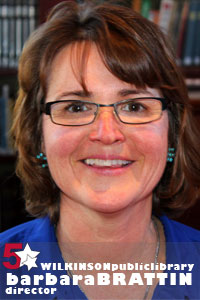
27 May FIVE STARS: EBOOKS, AN UPDATE
 Libraries spend a lot of time working out contracts with vendors. Historically, libraries have paid to access electronic information based either on the number of uses, or the number of people served (potential uses). Signing contracts that force the library to pay by use is counterproductive. On the one hand our budgets are fixed, and we do want the public to freely and copiously use information.
Libraries spend a lot of time working out contracts with vendors. Historically, libraries have paid to access electronic information based either on the number of uses, or the number of people served (potential uses). Signing contracts that force the library to pay by use is counterproductive. On the one hand our budgets are fixed, and we do want the public to freely and copiously use information.
The popularity of ebooks in public libraries is changing the way we do business. Typically, a middle man purchases rights to ebooks, then resells to our institutions under a variety of different models. The most common is purchase of access.
In purchase of access, libraries typically pay the cost of a hardcover title to a middle man for access to the ebook, one library patron at a time. If three people are waiting to access the title, the library must purchase another “copy” to speed up the waiting list. It’s very similar to the way we buy books, except that the library does not own the title. As soon as the contract with the middle man is over, the library loses access to all the titles it purchased.
Due to popular demand, libraries are witnessing different vendor models, including unlimited access to titles and scenarios which include owning the titles themselves and legally keeping them even if the relationship with the vendor is severed. The most interesting model, however, is direct purchasing of ebooks from publishers and management of content servers by libraries. It’s a lot of work, but librarians agree that is a better use of public money and a chance to drive the market towards a fairer model of use.
Douglas County (CO) Libraries are leading this ebook revolution. Through our membership in the Marmot Library Consortium, the Wilkinson Public Library is joining the project. Over the next year, we’ll be managing access to content without the middle man, negotiating our own contracts directly with publishers that allow unlimited access to electronic books we own. We’ll share space on an Adobe Content Server at Douglas County Libraries and pay a portion of a developer’s salary to manage the software. Access to ebooks under this model will flow directly through each library’s online catalog instead of forcing the user to another site to download the book. When accessing library account information online, patrons will see all items checked out, both physical and electronic, together in one list. Users will determine their own loan period and titles will be loaned to multiple simultaneous users. In short, libraries will be in control, and library users will enjoy a much better library experience.
The coming years will certainly redefine how publishers choose to manage electronic content. Publishers like Penguin have already pulled out of the library market, refusing to sell their electronic books to us. By joining in our own ebook revolution, libraries hope to change their minds, demonstrating the purchasing power of the public library market and the public’s demand for access to electronic information at a reasonable cost through a user friendly interface.
Welcome to the revolution.


Sorry, the comment form is closed at this time.